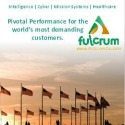
Capgemini Government Solutions is one of the few global players that offers federal agencies a full range of advisory, implementation and management services, while driving innovative ways to streamline organizations, reduce costs and stay operationally effective. The firm is growing fast and making a big splash in the government market. WashingtonExec sat down with Doug Lane, the firm’s CEO, to talk about the company’s secrets for growth, future plans and some of the challenges the government faces in the areas of cybersecurity and supply chain management.
WashingtonExec: What have been the major contributors to your company’s growth?
Doug Lane: In 2016 alone, we’ve more than doubled in size with a backlog that points to similar growth expected through 2017. Since I joined in 2014, we have harnessed the capabilities of Capgemini’s services, long recognized by industry analysts. We’re part of a global powerhouse – $13 billion in annual revenues with 180,000 employees worldwide – with customers who love our work. We’ve supported many of the Fortune 100 firms as well as many large government agencies around the world.
To grow the government sector, we did three things: First, we assembled an inspiring leadership team who have a passion for government work and enabling their missions. Second, we created a high-energy start-up culture marked by a high level of transparency that fosters engagement from all levels of the organization. People have fun and enjoy coming to work. Third, we implemented a focused strategy that is adaptive and responsive to changing market needs.
WashingtonExec: What are your strategies for continued growth and how do you plan to implement them?
Doug Lane: Since our strategy is working, the foundational elements will remain the same, including our sales and delivery model. I’m a firm believer in David Maister’s concept of “superpleasing” our clients. For example, he reminds consultants not to bring in executives for quarterly meeting to try to sell them on something new but rather to put the emphasis and extra efforts into delivering increasing value on a continual basis. If you’re bringing in executives, they should have a new idea on how to help the client drive results.
WashingtonExec: Describe your unique role as innovators in the commercial and public sectors, and how you leverage that through U.S. government experts.
Doug Lane: Government agencies cannot innovate successfully in isolation, just as commercial companies cannot. Success is measured is sprints now – weeks, not years. Given how quickly technology solutions are brought to market, we need to better assist government agencies with rapid testing and adoption of new technologies for quick wins.
Capgemini has an Applied Innovation Exchange model where we help source and apply innovation into the client’s organization. We don’t claim to have all of answers, but we do have a proven process; it’s not just a gadget lab. It’s a process to quickly apply new technologies to solve business problems and it’s an exchange with our partners – VCs, industry partners and academics. It’s experiential, and we can test innovations to reduce the risks before adoption.
WashingtonExec: Tell us about your recent wins for testing, supply chain, cybersecurity, cloud, and contract vehicles at GSA and other agencies.
Doug Lane: A few that stand out the most in my mind are those where clients, after meeting with us and hearing our stories, chose to open the aperture and request commercial qualifications. We are now supporting innovative programs around testing, supply chain, cybersecurity and cloud services.
Testing: We won a $50 million prime contract providing support for a Testing Center of Excellence using continuous integration. It’s an exciting move toward automation with efficiency gains for our client.
Supply chain: Regardless if you’re driving toward category management or reverse auction, we focus on building stakeholder consensus through each phase. The result for our client is significant: for every dollar identified via supply chain efficiencies, the client can reallocate the money back into the mission of the agency.
Cybersecurity: For our client, we’re protecting critical defense assets. Since the introduction of our framework, our client has seen the proactive monthly security incidents out-number cyberattacks by ratios as high as 8 to 1.
Cloud services: We’re one of the six awardees on General Services Administration’s Salesforce Implementation, Integration, and Support Services blanket purchase agreement. We recently won and kicked off a $20 million task order this October.
WashingtonExec: What strategies led to these wins and how do you plan to use those strategies in the future?
Doug Lane: Our strategy is simple: Put the client’s needs above our corporate or individual needs. It’s incumbent upon those of us in industry to put the customer and their mission first. U.S. government leaders are managing some of the most complex organizations in the world. They’re in the trenches every day and their teams bring invaluable insights. It’s our job to enable their visions – to make sure they can affect the transformation, large or small – in a selfless way. If we need to pull other partners in to get it done right, that’s what we do.
WashingtonExec: What, in your view, are the biggest challenges facing the federal government when it comes to cybersecurity and supply chain issues? How can your firm and others help address these challenges?
Doug Lane: Cyber: One of the biggest challenges facing the government when it comes to cybersecurity is the same one facing most cultures of large organizations: they are compliance driven, but the attacks are evolving and outpacing our rules and regulations. Results are what count. The U.S. CISO position is a good start to drive change in this area from the top down and across the government.
Moving forward, automation will be a key solution as it eliminates or reduces the possibility of human error – accidental or intentional. Testing automation – with the move toward agile and DevOps – is one of the front-lines of defense, and we’re recognized as one of the leaders in testing globally.
Supply Chain: In the supply chain arena, we see similar challenges with our government clients as we do with our commercial clients. They share concerns like safety, cost, citizen engagement, and resilience and reliability. But the biggest challenges now are building consensus among stakeholders and leveraging insights from data analytics before you overhaul the process. We leverage industry data to build compelling business cases, and work with stakeholders groups to get ahead of necessary process – even policy – changes.
Our federal clients often leverage our Accelerated Solutions Environment to drive consensus and accelerate decisions. It’s one of the most unique offerings I’ve experienced in my career. We can accomplish in a few days what typically takes months or even years.
Related: Security Clearance Reforms Encouraging but Incomplete, Says SVP Charles Sowell


